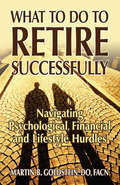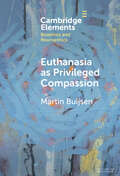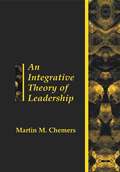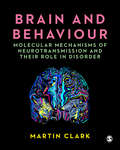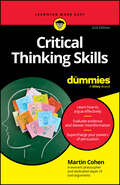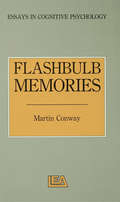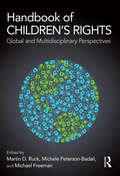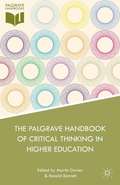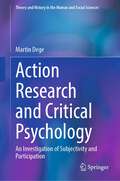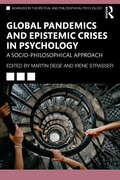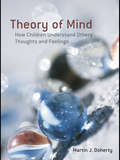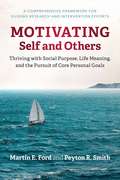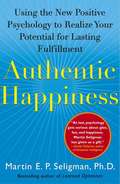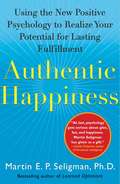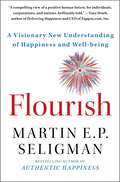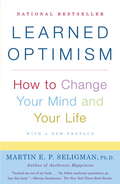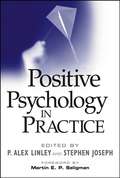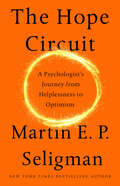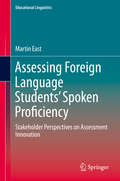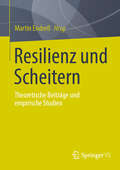- Table View
- List View
What to Do to Retire Successfully
by Martin B. GoldsteinSeventy-seven million baby boomers are slated to retire over the next twenty years: this boils down to approximately 10,000 daily (The Fiscal Times). Many are inadequately prepared, emotionally as well as financially. In What to Do to Retire Successfully, Goldstein lays out a step-by-step approach to achieving a successful and content retirement. Dr. Goldstein taps into his financial and psychiatry background as he explores the potential pitfalls of life after career's end, while providing helpful, proven solutions for a feasible and effective adjustment into retirement. He also analyzes how diverse personality types cope with retirement and suggests necessary modifications, as well as probing the unique problems of those forced into early retirement. In the financial realm, Dr. Goldstein offers specific formulas for continuance of comparable standard of living, steps for saving and investing, as well as tips for handling retirement resources. The lifestyle sections explore creating a dynamic plan for retirement living, the importance of setting up routines, keeping your mind engaged, daily exercise and making the necessary preparations needed to facilitate a successful transition into retirement living. What to Do to Retire Successfully is an englighting blend of actual retirement scenarios, intermingled with healthy, practical advice from a respected neuropsychiatrist, who is a fellow retiree, with a wonderfully optimistic glass half full philosophy towards living a fulfilling retirement life.
Euthanasia as Privileged Compassion (Elements in Bioethics and Neuroethics)
by Martin BuijsenThis Element overviews developments and issues in Dutch euthanasia practice. Following an outline of the history of the Dutch Euthanasia Act and a survey of the most critical trends and figures, some current issues are explored in depth: euthanasia and incompetency, euthanasia by nonphysicians, and euthanasia for those who consider their lives completed. This Element is intended for a general readership, including undergraduate students in law, medicine, or ethics. This title is also available as Open Access on Cambridge Core.
An Integrative Theory of Leadership (Social Psychology Ser.)
by Martin ChemersA definition of leadership that would be widely accepted by the majority of theorists and researchers might say that "leadership is a process of social influence in which one person is able to enlist the aid and support of others in the accomplishment of a common task." The major points of this definition are that leadership is a group activity, is based on social influence, and revolves around a common task. While this specification seems relatively simple, the reality of leadership is very complex. Intrapersonal factors (thoughts and emotions) interact with interpersonal processes (attraction, communication, and influence) to have effects on a dynamic external environment. Each of these aspects brings complexity to the leadership process. It is the purpose of this book to make that complexity a bit more manageable, increasing the ability to understand what effective leadership is. This volume offers a comprehensive analysis and integration of the empirical research literature and major theories of leadership. It employs a functional analysis stressing what leaders must do to be effective and specifies the processes related to each function. The chapters provide an extensive review of the major approaches to leadership. Each chapter is discussed with an eye to explaining the basic principles, the research evidence, and where appropriate, the relationship of the theory or research program to other theories. In addition, this volume offers the most comprehensive treatment of cultural and gender factors in leadership of any recent book. The question of male-female differences in leadership style and performance is carefully analyzed against the empirical findings. The ultimate goal of this review of the literature is to provide a basis for the presentation of an integrative model of leadership that brings together function and process and provides an armature for integrating what is known.
Brain and Behaviour: Molecular Mechanisms of Neurotransmission and their Role in Disorder
by Martin ClarkWant to understand the biological processes that underpin our behaviour? Look no further! Neurotransmitters are a core element of biological psychology and essential for the correct operation of brain circuits. This textbook focuses on eight core neurotransmitters and explores the machinery underpinning their function. This includes how they are synthesised, packaged, and facilitate communication between neurons. Each chapter focuses on a single neurotransmitter, outlining its machinery and discussing what research suggests about how the alteration of this machinery may contribute to various atypical behavioural states. This structure will help guide the reader through complex ideas in a clear and comprehensive manner. From Dopamine to Nitric Oxide, and from Acetylcholine to Serotonin, Brain and Behaviour places specific focus on how alterations in neurotransmitters can contribute to specific atypical behaviour such as ASD, Epilepsy, Depression, and Addiction. It is essential reading for any student of neuropsychology, neuroscience, or biological psychology. Brain and Behaviour also includes features to help enhance your understanding of neurotransmitters, such as: - Research methods focus boxes - Famous researcher spotlight - Test yourself questions Martin Clark is Lecturer in Neurobiology at the University of Central Lancashire.
Brain and Behaviour: Molecular Mechanisms of Neurotransmission and their Role in Disorder
by Martin ClarkWant to understand the biological processes that underpin our behaviour? Look no further! Neurotransmitters are a core element of biological psychology and essential for the correct operation of brain circuits. This textbook focuses on eight core neurotransmitters and explores the machinery underpinning their function. This includes how they are synthesised, packaged, and facilitate communication between neurons. Each chapter focuses on a single neurotransmitter, outlining its machinery and discussing what research suggests about how the alteration of this machinery may contribute to various atypical behavioural states. This structure will help guide the reader through complex ideas in a clear and comprehensive manner. From Dopamine to Nitric Oxide, and from Acetylcholine to Serotonin, Brain and Behaviour places specific focus on how alterations in neurotransmitters can contribute to specific atypical behaviour such as ASD, Epilepsy, Depression, and Addiction. It is essential reading for any student of neuropsychology, neuroscience, or biological psychology. Brain and Behaviour also includes features to help enhance your understanding of neurotransmitters, such as: - Research methods focus boxes - Famous researcher spotlight - Test yourself questions Martin Clark is Lecturer in Neurobiology at the University of Central Lancashire.
Critical Thinking Skills For Dummies
by Martin CohenLearn how to argue points effectively, analyze information, and make sound judgments The ability to think clearly and critically is a lifelong benefit that you can apply in any situation that calls for reflection, analysis, and planning. Being able to think systematically and solve problems is also a great career asset. Critical Thinking Skills For Dummies helps you hone your thinking abilities and become a better communicator. You’ll find hands-on, active instruction and exercises that you can put to work today as you navigate social media and news websites, chat with AI, fact-check your own and others’ views, and more. Become a thinking machine, with this Dummies guide. Identify other people’s arguments and conclusions—and spot holes in them Evaluate evidence and produce more effective arguments in any situation Read between the lines of what people say and form your own judgments Apply critical thinking to school or college assignments to improve your academic performance This is the perfect Dummies title for students, researchers, and everyone who seeks to improve their reasoning and analysis ability.
Flashbulb Memories (Essays in Cognitive Psychology)
by Martin ConwayThis book provides a state-of-the-art review and critical evaluation of research into 'flashbulb' memories. The opening chapters explore the 'encoding' view of flashbulb memory formation and critically appraise a number of lines of research that have opposed this view. It is concluded that this research does not provide convincing evidence for the rejection of the encoding view. Subsequent chapters review and appraise more recent work which has generally found in favour of the flashbulb concept. But this research too, does not provide unequivocal support for the encoding view of flashbulb memory formation. Evidence from clinical studies of flashbulb memories, particularly in post-traumatic stress disorder and related emotional disturbances, is then considered. The clinical studies provide the most striking evidence of flashbulb memories and strongly suggest that these arise in response to intense affective experiences. Neurobiological models of memory formation are briefly reviewed and one view suggesting that there may be multiple routes to memory formation is explored in detail. From this research it seems possible that there could be a specific route for the formation of detailed and durable memories associated with emotional experiences. In the final chapter a cognitive account of flashbulb memories is outlined. This account is centred on recent plan-based theories of emotion and proposes that flashbulb memories arise in responses to disruptions of personal and cultural plans. This chapter also considers the wider functions of flashbulb memories and their potential role in the formation of generational identity.
Applying Rawls in the Twenty-First Century
by Martin D. CarcieriJohn Rawls is the most influential political thinker of the twentieth century. Most of the scholarly literature on Rawls defends, critiques, or elaborates on some aspect of his theory. These writings are often valuable, yet this book goes beyond them. Like a few scholars, rather than debating whether and how Rawls got things right or wrong, Martin Carcieri take his well-defended principles of justice - especially the equal liberty, fair equality of opportunity, and difference principles atthe core of his theory - as given and apply them to aspects of four major, enduring, concrete domestic policy, ethical, and constitutional issues. These applications yield counter-intuitive implications that will challenge the ideological left and right alike, contributing to our understanding both of Rawls and of these issues. At the core, this book deepens our understanding of these issues and points the way toward rational, just policy reform.
Handbook of Children's Rights: Global and Multidisciplinary Perspectives
by Michael Freeman Martin D. Ruck Michele Peterson-BadaliWhile the notion of young people as individuals worthy or capable of having rights is of relatively recent origin, over the past several decades there has been a substantial increase in both social and political commitment to children’s rights as well as a tendency to grant young people some of the rights that were typically accorded only to adults. In addition, there has been a noticeable shift in orientation from a focus on children’s protection and provision to an emphasis on children’s participation and self-determination. With contributions from a wide range of international scholars, the Handbook of Children’s Rights brings together research, theory, and practice from diverse perspectives on children’s rights. This volume constitutes a comprehensive treatment of critical perspectives concerning children’s rights in their various forms. Its contributions address some of the major scholarly tensions and policy debates comprising the current discourse on children’s rights, including the best interests of the child, evolving capacities of the child, states’ rights versus children’s rights, rights of children versus parental or family rights, children as citizens, children’s rights versus children’s responsibilities, and balancing protection and participation. In addition to its multidisciplinary focus, the handbook includes perspectives from social science domains in which children’s rights scholarship has evolved largely independently due to distinct and seemingly competing assumptions and disciplinary approaches (e.g., childhood studies, developmental psychology, sociology of childhood, anthropology, and political science). The handbook also brings together diverse methodological approaches to the study of children’s rights, including both quantitative and qualitative perspectives, and policy analysis. This comprehensive, cosmopolitan, and timely volume serves as an important reference for both scholarly and policy-driven interest in the voices and perspectives of children and youth.
The Palgrave Handbook of Critical Thinking in Higher Education
by Martin Davies Ronald BarnettPalgrave Handbook of Critical Thinking in Higher Education explores critical thinking in higher education in all its forms, from definitions to teaching and incorporating it into the curriculum, its relationship to culture and the professions, and its social perspectives and scientific and cognitive manifestations. Davies and Barnett ask what is critical thinking, especially in the context of higher education? The handbook explores these questions, with contributors offering their insight into the contemporary understandings of higher education worldwide.
Action Research and Critical Psychology: An Investigation of Subjectivity and Participation (Theory and History in the Human and Social Sciences)
by Martin DegeThis book examines the theoretical developments in the field of Action Research from a historical perspective. The central focus of the investigation is the concepts of democracy and subjectivity as defined by the field’s various traditions. To address this issue, this book offers a thorough investigation of the theoretical and historical underpinnings of Action Research in order to argue that such a clarification allows for a transcendence of the distinction between theory and practice in political action. This transcendence will be achieved with the theories of the German critical psychologist Klaus Holzkamp and his interpretation of subjectivity and democracy. Holzkamp establishes a comprehensive mode of change based on the contradiction of existing possibilities for action and restrictions in a concretely given empirical situation. This book is aimed at History of Psychology Classes, Social Workers, Activism Researchers, Undergraduate Courses in Critical Thinking and Political Action, and Decolonial Theory in Psychology.
Global Pandemics and Epistemic Crises in Psychology: A Socio-Philosophical Approach
by Martin DegeUsing COVID-19 as a base, this groundbreaking book brings together several renowned scholars to explore the concept of crisis, and how this global event has shaped the discipline of psychology. It engages directly with the challenges that psychology continues to face when theorizing societal issues of gender, race, class, history, and culture, while not disregarding "lived" experiences. This edited volume offers a set of pathways to rethink psychology beyond its current scope and history to become more apt to the conditions, needs, and demands of the 21st century. The book explores topics like resilience, interpersonal relationships, mistrust in the government, and access to healthcare. Dividing the book into three distinct sections, the contributors first examine the current crisis within psychology, then go on to explore how psychology theorizes the subject and the other in a social world of perpetual political, economic, cultural, and social crises, and lastly consider the role of crises in the creation of new theorizing. This is essential reading for advanced undergraduate and postgraduate students of theoretical and philosophical psychology, social psychology, community psychology, and developmental psychology.
Theory of Mind: How Children Understand Others' Thoughts and Feelings (International Texts in Developmental Psychology)
by Martin DohertyMost of us are continually aware that others have thoughts and feelings – but are children? When? This book is a concise and readable review of the extensive research into children’s understanding of what other people think and feel, a central topic in developmental psychology known as "Theory of Mind". The understanding of belief is central to this text, which explains in simple terms what representational theory of mind is all about, and shows how researchers have demonstrated this understanding in 4-year-olds. The book considers what leads to this understanding, including the role of pretend play, understanding of attention and eye direction, and other precursors to representational understanding of mind. The general relevance of theory of mind is demonstrated through coverage of the development of other mental state concepts, and the relationship between understanding mental representation and other representational media. The author also carefully summarizes current research on the relationship between theory of mind and concurrent developments in executive functioning, and the understanding of language. The book closes by considering autism. A major achievement of theory of mind research is the light it has helped throw on this puzzling developmental disorder. Providing a comprehensive overview of 25 years of research into theory of mind, the book will be of great interest to both students and researchers in psychology, philosophy and the cognitive sciences.
Motivating Self and Others: Thriving with Social Purpose, Life Meaning, and the Pursuit of Core Personal Goals
by Martin E. Ford Peyton R. SmithThis book describes the essential nature of human motivation by integrating the best ideas and evidence from motivational and evolutionary science. In doing so, the authors explain how the cultivation of goal-life alignment and 'thriving with social purpose' motivational patterns can inspire optimal functioning and enhance life meaning. Readers are provided with a comprehensive framework for guiding research and intervention efforts along with motivational principles designed to summarize the major themes in effective efforts to motivate yourself and those you wish to help or encourage. Special emphasis is placed on the importance of life meaning in empowering our motivational systems and protecting us from downward spirals of disappointment and suffering. Compelling evidence is provided to support the view that social purpose is as fundamental as self-interest in human motivational systems. The authors also focus on the catalytic role of social purpose in enabling humans to soar above all other species.
Authentic Happiness: Using the New Positive Psychology to Realize Your Potential for Lasting Fulfillment
by Martin E. P. SeligmanSeligman shows how Positive Psychology is shifting the profession's paradigm away from its narrow-minded focus on pathology, victimology, and mental illness to positive emotion and mental health.
Authentic Happiness: Using the New Positive Psychology to Realize Your Potential for Lasting Fulfillment
by Martin E. SeligmanA national bestseller, Authentic Happiness launched the revolutionary new science of Positive Psychology—and sparked a coast-to-coast debate on the nature of real happiness.According to esteemed psychologist and bestselling author Martin Seligman, happiness is not the result of good genes or luck. Real, lasting happiness comes from focusing on one’s personal strengths rather than weaknesses—and working with them to improve all aspects of one’s life. Using practical exercises, brief tests, and a dynamic website program, Seligman shows readers how to identify their highest virtues and use them in ways they haven’t yet considered. Accessible and proven, Authentic Happiness is the most powerful work of popular psychology in years.
Flourish: A Visionary New Understanding of Happiness and Well-being
by Martin E. SeligmanFrom the bestselling author of Learned Optimism and Authentic Happiness comes “a relentlessly optimistic guidebook on finding and securing individual happiness” (Kirkus Reviews).With this unprecedented promise, internationally esteemed psychologist Martin Seligman begins Flourish, his first book in ten years—and the first to present his dynamic new concept of what well-being really is. Traditionally, the goal of psychology has been to relieve human suffering, but the goal of the Positive Psychology movement, which Dr. Seligman has led for fifteen years, is different—it&’s about actually raising the bar for the human condition. Flourish builds on Dr. Seligman&’s game-changing work on optimism, motivation, and character to show how to get the most out of life, unveiling an electrifying new theory of what makes a good life—for individuals, for communities, and for nations. In a fascinating evolution of thought and practice, Flourish refines what Positive Psychology is all about. While certainly a part of well-being, happiness alone doesn&’t give life meaning. Seligman now asks, What is it that enables you to cultivate your talents, to build deep, lasting relationships with others, to feel pleasure, and to contribute meaningfully to the world? In a word, what is it that allows you to flourish? &“Well-being&” takes the stage front and center, and Happiness (or Positive Emotion) becomes one of the five pillars of Positive Psychology, along with Engagement, Relationships, Meaning, and Accomplishment—or PERMA, the permanent building blocks for a life of profound fulfillment. Thought-provoking in its implications for education, economics, therapy, medicine, and public policy—the very fabric of society—Flourish tells inspiring stories of Positive Psychology in action, including how the entire U.S. Army is now trained in emotional resilience; how innovative schools can educate for fulfillment in life and not just for workplace success; and how corporations can improve performance at the same time as they raise employee well-being. With interactive exercises to help readers explore their own attitudes and aims, Flourish is a watershed in the understanding of happiness as well as a tool for getting the most out of life. On the cutting edge of a science that has changed millions of lives, Dr. Seligman now creates the ultimate extension and capstone of his bestselling classics, Authentic Happiness and Learned Optimism.
Learned Optimism: How to Change Your Mind and Your Life
by Martin E. SeligmanKnown as the father of the new science of positive psychology, Martin E.P. Seligman draws on more than twenty years of clinical research to demonstrate how optimism enhances the quality of life, and how anyone can learn to practice it. Offering many simple techniques, Dr. Seligman explains how to break an "I-give-up" habit, develop a more constructive explanatory style for interpreting your behavior, and experience the benefits of a more positive interior dialogue. These skills can help break up depression, boost your immune system, better develop your potential, and make you happier. With generous additional advice on how to encourage optimistic behavior at school, at work and in children, Learned Optimism is both profound and practical--and valuable for every phase of life.
Positive Psychology in Practice
by Martin E. Seligman Stephen Joseph P. Alex LinleyA thorough and up-to-date guide to putting positive psychology into practiceFrom the Foreword: "This volume is the cutting edge of positive psychology and the emblem of its future."-Martin E. P. Seligman, Ph.D., Fox Leadership Professor of Psychology, University of Pennsylvania, and author of Authentic HappinessPositive psychology is an exciting new orientation in the field, going beyond psychology's traditional focus on illness and pathology to look at areas like well-being and fulfillment. While the larger question of optimal human functioning is hardly new - Aristotle addressed it in his treatises on eudaimonia - positive psychology offers a common language on this subject to professionals working in a variety of subdisciplines and practices. Applicable in many settings and relevant for individuals, groups, organizations, communities, and societies, positive psychology is a genuinely integrative approach to professional practice.Positive Psychology in Practice fills the need for a broad, comprehensive, and state-of-the-art reference for this burgeoning new perspective. Cutting across traditional lines of thinking in psychology, this resource bridges theory, research, and applications to offer valuable information to a wide range of professionals and students in the social and behavioral sciences.A group of major international contributors covers: The applied positive psychology perspective Historical and philosophical foundations Values and choices in pursuit of the good life Lifestyle practices for health and well-being Methods and processes for teaching and learning Positive psychology at workThe best and most thorough treatment of this cutting-edge discipline, Positive Psychology in Practice is an essential resource for understanding this important new theory and applying its principles to all areas of professional practice.
The Hope Circuit: A Psychologist's Journey from Helplessness to Optimism
by Martin E. SeligmanOne of the most influential living psychologists looks at the history of his life and discipline, and paints a much brighter future for everyone.When Martin E. P. Seligman first encountered psychology in the 1960s, the field was devoted to eliminating misery: it was the science of how past trauma creates present symptoms. Today, thanks in large part to Seligman's Positive Psychology movement, it is ever more focused not on what cripples life, but on what makes life worth living--with profound consequences for our mental health.In this wise and eloquent memoir, spanning the most transformative years in the history of modern psychology, Seligman recounts how he learned to study optimism--including a life-changing conversation with his five-year-old daughter. He tells the human stories behind some of his major findings, like CAVE, an analytical tool that predicts election outcomes (with shocking accuracy) based on the language used in campaign speeches, the international spread of Positive Education, the launch of the US Army's huge resilience program, and the canonical studies that birthed the theory of learned helplessness--which he now reveals was incorrect. And he writes at length for the first time about his own battles with depression at a young age.In The Hope Circuit, Seligman makes a compelling and deeply personal case for the importance of virtues like hope, gratitude, and wisdom for our mental health. You will walk away from this book not just educated but deeply enriched.
Assessing Foreign Language Students' Spoken Proficiency: Stakeholder Perspectives on Assessment Innovation (Educational Linguistics #26)
by Martin EastThis book presents an indepth study of assessment innovation and its impact on teaching and learning. The context is New Zealand, and the focus is additional languages other than English and the recent introduction of a radical new assessment of students' spoken proficiency, called interact. The book crosses the traditional theoretical and methodological boundaries associated with language testing research, which focuses on assessment performance, and presents an alternative approach where stakeholders become the centre of interest. It advances our understanding of how assessment innovation impacts on two key groups - teachers and students in schools - based on data collected from a substantial twoyear research project. It presents an account of these stakeholders' perceptions of the validity and usefulness of the new assessment in comparison with the more traditional test that it has replaced. Assessing Foreign Language Students' Spoken Proficiency makes an outstanding and original contribution to the field of second and foreign language teaching, providing a theory and research-based account of the development of a learner-centred approach to oral proficiency assessment. It is an important resource for teachers and teacher educators as well as assessment and curriculum specialists worldwide. It deserves to be widely read.
Resilienz und Scheitern: Theoretische Beiträge und empirische Studien
by Martin EndreßWill man über Resilienz sprechen, darf man über Scheitern nicht schweigen. Das gilt gerade dann, wenn mit einem reflexiven Resilienzbegriff der prozessuale Zuschnitt dieser Beobachtungsperspektive für die Deutung sozio-historischen Geschehens stark gemacht werden soll. Solchermaßen kommen nicht nur Konstellationen eines produktiven Scheiterns in den Blick, sondern ebenso die komplexe Mehrebenenstruktur von Resilienzprozessen, die das Scheitern auf einer mit dem Gelingen auf anderen Ebenen sozialer Prozesse zusammendenken lassen. Zum Themenfeld "Resilienz und Scheitern" versammelt der Band historische und sozialwissenschaftliche Beiträge, die das ambivalente Verhältnis von Resilienzprozessen und Diagnosen des Scheiterns in theoretisch-konzeptioneller Hinsicht ausloten und in ausgewählten historischen Fallstudien vom 13. bis ins 20. Jahrhundert hinein empirisch veranschaulichen. Die Beiträge schreiben damit die Bemühungen der Trierer Forschungsgruppe "Resilienz - Gesellschaftliche Umbruchphasen im Dialog zwischen Mediävistik und Soziologie" fort, ein kritisch reflektiertes Resilienzkonzept für historische und sozialwissenschaftliche Analysen fruchtbar zu machen.
Motivating Humans: Goals, Emotions, and Personal Agency Beliefs
by Martin Eugene FordThis volume provides a precise and comprehensive description of human motivation. Drawing on psychology, education and management, Ford integrates classic and contemporary motivation theory into a unified framework - Motivational Systems Theory - from which he derives 17 principles for motivating people. The book provides concrete examples throughout and includes a chapter on practical applications such as: promoting social responsibility in young people; increasing motivation for learning and school achievement; increasing work productivity and job satisfaction; and helping people lead emotionally healthy lives.
Historical and Philosophical Foundations of Psychology
by Martin FarrellThis textbook connects the big ideas and key thinkers of psychology and philosophy in a clear and cohesive theoretical narrative. Students are led to understand the relations between different schools of thought, and to connect the various thinkers, theories and facts in psychology's history. Focusing on the major ideas that have reoccurred throughout history, such as the mind-body problem and the role of the mind in our experience, Martin Farrell shows how specific thinkers have explored the same ideas, but in different ways, leading to distinct schools of thought. The coherent narrative enables students to see the bigger picture, through which the historical and conceptual roots of psychology can be easily understood.
Therapeutische Arrangements im Maßregelvollzug: Studien zur Leerstellengrammatik und den Bezugsproblemen in der forensischen Psychiatrie
by Werner Vogd Martin FeißtAuf Basis von Feldforschungen und Interviews in 6 forensischen Kliniken werden die Herausforderungen der Therapie und Resozialisierung im Maßregelvollzug untersucht. Es werden grundlegende Dilemmata der Therapie unter Zwang herausgearbeitet und typische Probleme und Chancen aufgezeigt, die mit Versuch der Normalisierung der Patienten einhergehen. Es wird eine systemische Analyseperspektive gewählt, die den Blick sowohl auf die konkreten Beziehungen wie auch das organisationale Gefüge und seiner gesellschaftlichen Einbettung lenkt.
